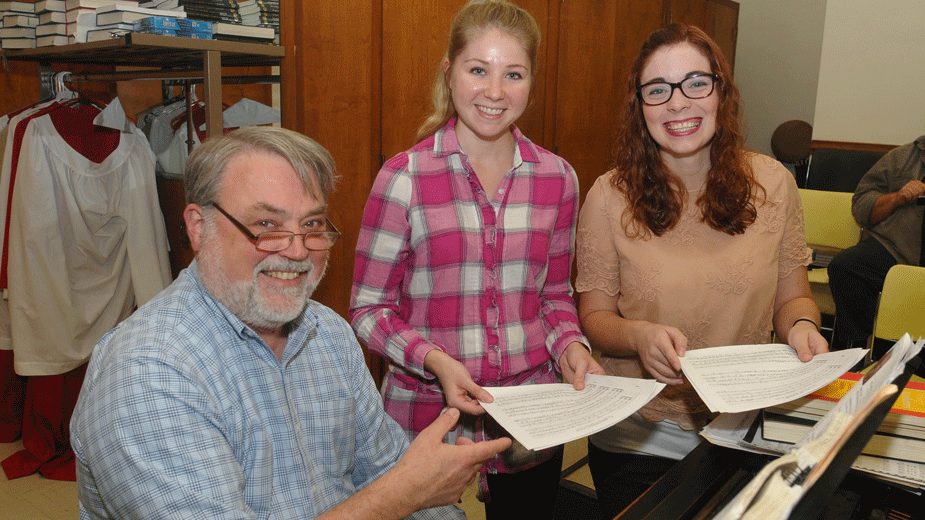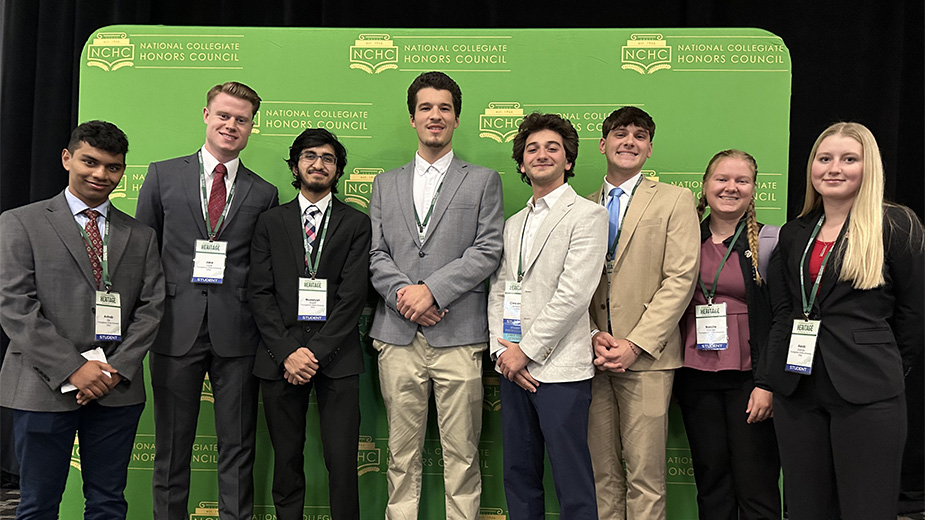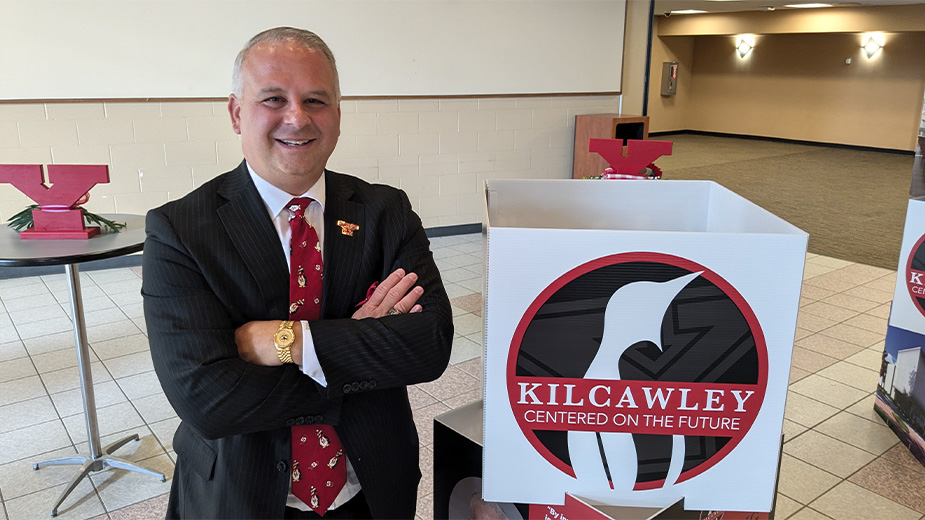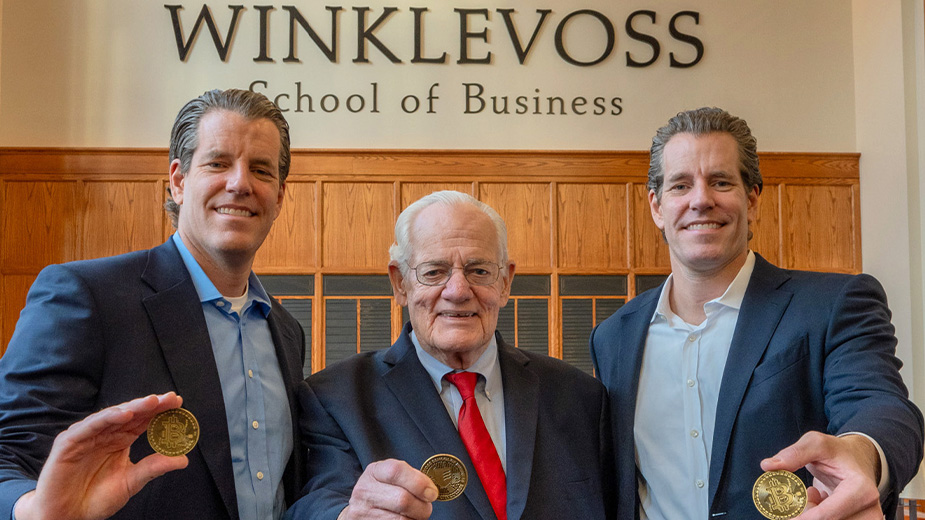YSU Music Majors Give Voice to Their Dreams
YOUNGSTOWN, Ohio — The chances that four music majors at Youngstown State University will one day sing in the world’s major opera houses or play with world-acclaimed orchestras are about the same as its athletes playing Major League Baseball or in the National Football League.
It’s happened. Think Ron Jaworski, Cliff Stoudt, Paul McFadden and Jeff Wilkins – two quarterbacks and two kickers who starred in the NFL. Or Justin Thomas and Brad Hennessey, two Penguins who pitched in the Major Leagues.
So Caitlin Hedge, Francesca Molinaro, Rebecca Enlow, and Victor Cardamone, four talented musicians studying in YSU’s Dana School of Music, could realize their aspirations to either sing the lead role in operas or play violin in a large-city symphony orchestra.
Cardamone, a tenor who graduates in December, says, “I realize it’s very risky [pursuing a career in opera], but I know there’s a spot for me somewhere.”
All four will perform Nov. 12 in Stambaugh Auditorium in Georges Bizet’s “Carmen,” this year’s performance of Opera Western Reserve. Enlow, a soprano, will play Frasquita, a friend of Carmen, while Molinaro and Cardamone will sing in the chorus. Hedge will play violin in the orchestra.
Next spring, Molinaro, a soprano, will be the prima donna, playing Madame Goldentrill, in a comic opera, “The Impressario,” an opera within an opera.
After earning her master’s, she intends to try out at the leading opera companies, including the Metropolitan Opera in New York City. “I know there’s a lot of competition,” Molinaro says, and one factor is being in the right place at the right time. But she believes she has the talent and self-discipline to hold her own.
Enlow, who grew up in Salem, has studied music abroad, spending two weeks last summer in Hungary at the University of Szeged and performing opera classes there. The university of 25,000 students, a two-hour drive south-southeast of Budapest, is highly acclaimed and has been ranked among the top 300 in the world, according to Wikipedia.
Should her career in opera fall through, Enlow “will go back to school to get a Ph.D. and teach at the college level.”
Hedge, a second-year graduate student, is as at home in country music (where the violin is a fiddle) as she is in classical music.
“I love them both,” she says, and “strongly considered going the folk-style route” before turning her energies to classical music.
“Fiddle music still influences my solo-playing style,” Hedge says as she points out, “When you play in an orchestra, you have to adjust to everyone around you.”
Most undergraduates who study in the Dana School are music-education majors, professor Misook Yun says, because the faculty appreciates the need of its graduates to earn a living. Many go on to be band, orchestra or choir directors in public schools.
The four students profiled in this article are well aware of the competition they face, and how long it will likely take, before they lead the cast of an opera, sit in the first chair of an orchestra or even become concertmaster.
They are not deterred.
Molinaro’s parents, Henry and Cynthia, saw their daughter’s talent when she was five. Molinaro was singing along with the theme of Walt Disney’s “The Jungle Book” and, “Mom told me I had good pitch.”
Henry Molinaro, a music educator who had his own band, was equally supportive. At age 10, Francesca began taking flute lessons – they lasted until she graduated from high school – but “didn’t take voice lessons until I was 14.”
She sang in the musicals her community theater put on and later those at her high school. And while she played flute in the high school band, “I felt more confident while singing,” Molinaro says. “My voice teacher, Lillian Long, encouraged me and helped build my confidence.”
It wasn’t until she was in Alderson Broaddus University, in Philippi, W.Va., that she “began studying opera,” Molinaro says. “I felt I could be more expressive. It had a story and more of a repertoire. Opera had more substance. It was more challenging.”
The soprano has been part of scenes from several operas, from Rosina, the love interest, in Paisiello’s “The Barber of Seville,” to Sadie, a poor farm girl, in Carlisle Floyd’s “Slow Dusk.” “Slow Dusk,” which has become a minor American classic (its premiere was 1949), is a one-act drama set in the Carolinas.
Also this spring, Molinaro will sing and play Olympia whose aria is “The Doll’s Song” in Jacques Offenbach’s “Tales of Hoffmann.”
“I really like ‘Tales of Hoffmann,’ ” the soprano says, and Mozart.
Enlow’s parent saw her talent when she was six and that year had her in the Salem Community Theatre production of “A Christmas Carol.”
Her voice lessons began at age 12 and Salem High School choir director Attila Samu “introduced me to singing classical music,” Enlow says. “I was given so many opportunities.”
She’s “a fan of Puccini and Donizetti.” Of the former, Enlow says, “His stories are dramatic and I love how his music and lyrics work together.”
Besides voice, she is self-taught on guitar, “tried French horn in high school” and has learned some piano.
Cardamone, with a double major in voice and French horn, “want[s] to become an opera singer,” he says. “Opera is something I’ve grown to love.”
Both his parents sang. The youngest in his family, but the one “they discovered had absolute pitch,” Cardamone was given both voice and instrument lessons.
“It wasn’t until high school that I knew I wanted to pursue music as a career,” he says, “that I knew I wanted to become a teacher.”
When she was six, Hedge’s parents offered her the choice of studying ballet or music. She chose music.
And then the choice of violin or piano. (Her aunt taught piano.) But, “I loved to draw. I loved to paint.”
Before enrolling at Baldwin Wallace University where she was a violin major, Hedge become involved in folk music and won several fiddle contests. “I was 11 when I won my first fiddle contest. And I won a lot of contests,” she says matter-of-factly, including one in Nashville.
As a teenager, she “played folk music in a band with my family” as well as in the Mansfield (Ohio) Youth Symphony. She performed with other regional orchestras and was chosen for a seat in the all-state orchestra
She loves Tchaikovsky – his fifth symphony is her favorite – and Beethoven. She tells of a violin concerto she heard virtuoso Nathan Milstein play. “I had it memorized before I saw the music,” Hedge recalls.
She spent last summer in Graz, Austria, performing with its orchestra and networking. “I made a lot of contacts,” Hedge says. “The music world is smaller than it seems.”
Practice and conditioning is no less important to these four musicians than the men and women who play varsity sports at YSU. Molinaro and Enlow jog. And Hedge says, “I do a lot of yoga. In music, we’re always working muscles.”
Cardamone says, “I enjoy running” and credits professor Yun, for encouraging all of her students to engage in 20 minutes of cardiovascular exercise every day.
Besides practicing “at least an hour a day,” Molinaro first warms up 10 to 15 minutes. “I have my music in front of me” and the correct posture is essential. “I like to stand when I practice. Your body can’t be hunched over and you must sustain your breath. The tone – you want it to be full and your throat must be relaxed.
At the end, “If it was good, I leave the practice room with energy, feeling like I was challenged.”
Enlow practices two hours a day, six days a week. “I allow a day off,” she says.
Hedge practices violin anywhere from 45 minutes to an hour, usually three times a day. “Quality means so much more to me now than quantity,” she says, recalling that in high school she spent “three to five hours a day [in practice], sometimes seven.”
When the singers aren’t exercising their voices, they’re learning French, German and Italian. More accurately, they’re learning the correct pronunciation and how to enunciate the lyrics in these languages. Among their classes at Dana are French, German and Italian for opera singers.
All carry heavy course loads and have part-time jobs, Molinaro and Enlow helping the choir at St. John’s Episcopal Church rehearse on Wednesday evenings. Molinaro works with the sopranos.
All appreciate what they’ve undertaken. “Sometimes I’m in Bliss Hall until midnight practicing,” Enlow says.
“I have so much music to learn,” Hedge says. “I’m taking lessons on viola [as well].”
Cardamone speaks for all when he says, “I’m shooting for the moon but I will land among the stars.”
Pictured: Francesca Molinaro and Rebecca Enlow spend one night a week assisting Richard Konzens, the choir director at St. John’s Episcopal Church in Youngstown. Konzens, a professor of music at Grove City College, gave his final organ recital Nov. 4 at the college.
Copyright 2024 The Business Journal, Youngstown, Ohio.



